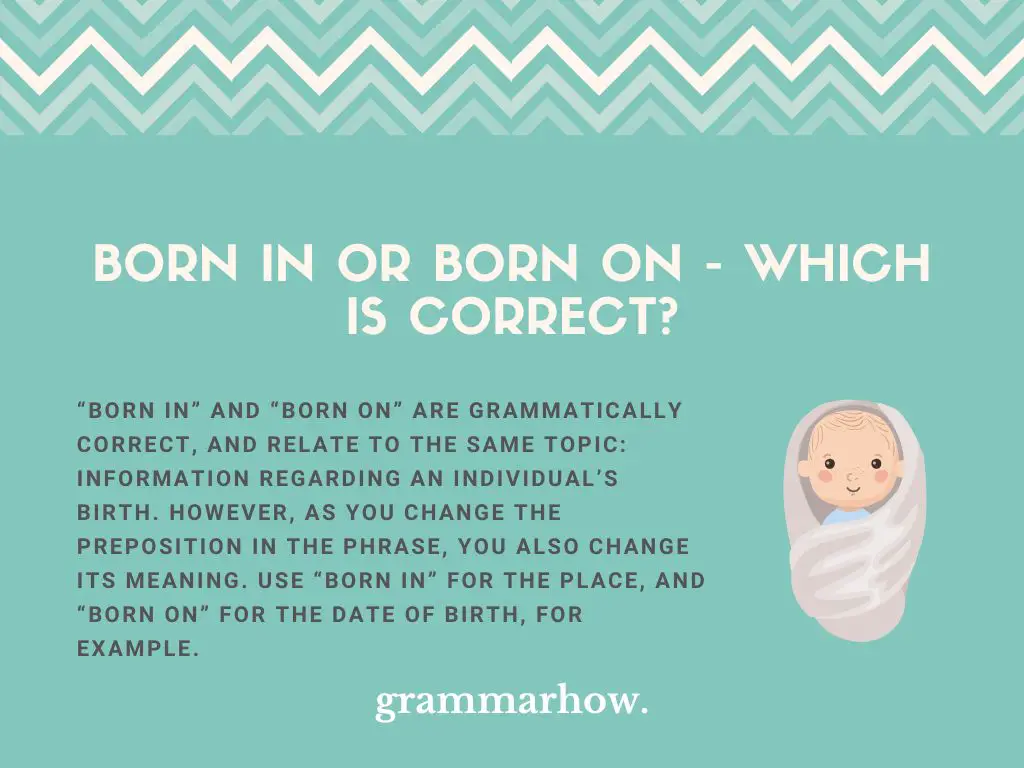There is a lot of information people may want to share about they’re birth. Expressions “Born In” and “Born On” help with that, by introducing facts such as: the date, the place, the exact time, the name of the city, etc.
But when should we use each form? Let’s see!
Born In or Born On – Which Is Correct?
“Born In” and “Born On” are grammatically correct, and relate to the same topic: information regarding an individual’s birth. However, as you change the preposition in the phrase, you also change its meaning. Use “Born In” for the place, and “Born On” for the date of birth, for example.

Take a look at some examples:
- Ivan was born in Chile.
- Dominic was born on the 25th of August.
- Luana was born in 2005.
- Manuella was born on a very cold day.
The sentences reflect different possibilities for the use of the forms “Born In” and “Born On”. The first and third sentences indicate instances in which you should use “Born In”, like to inform the country of birth and the year of birth, for example.
“Born On” is shown in the second and fourth sentences, in which it indicates the date of birth (complete with day and month) and the characteristics of the day in which a person was born.
The rule for the use of those prepositions following “Born” can be tricky and confusing. We recommend you try to memorize what each expression can address – although memorizing isn’t exactly fun for most people, it’s a tool sometimes we all have to use.
Born In
“Born In” helps share information about someone’s birth. Use “Born In” to state the year, the month, or the season of someone’s birth. Also, use “Born In” to indicate the city, country, or place an individual was born – as long as it’s not a specific address or location.
Take a look at some examples:
- Paul was born in 1993, and his sister in 1999.
- I was born in that hospital across the street.
- Anna was born in March, very close to springtime.
- Juan and Marcos were born in Spain.
- He was born in the winter, while I was living in Canada.
- I was born in Argentina but raised in England.
Born On
“Born On” is another way to share information about someone’s birth. Use “Born On” to state the day of the week or holiday of an individual’s birth. Also, use “Born On” to state the full date of birth and days in general.
Take a look at examples that contain “Born On”:
- Gianna was born on the 17th of February.
- Jim was born on the same day as his mother.
- I was born on Valentine’s Day.
- Hank was born on a Tuesday.
- Both my children were born on holidays.
It may be difficult, at first, to differentiate when to use “Born On” and “Born In”. Considering there are many different possibilities for both phrases, our recommendation is that you make an effort to memorize the rules.
With practice and time, all of those different variables will come to you naturally, without even having to think about them. But you must start somewhere, an memorization in this instance, may help.
Which Is Used the Most?
Which one of those forms is used more often, “Born In” or “Born On”? Take a look at the graph from Google Ngram Viewer below, to compare.

“Born In” seems to be used much more often than “Born On”. We can’t deny that “Born In” seems to apply to more things than “Born On” and it could mean, as a consequence, that “Born In” would be more used in general.
However, the graph shows that the use for “Born In” has been dropping over the years, while “Born On” has maintained the same use with little to no change.
Final Thoughts
“Born In” and “Born On” provide information about someone’s birth, but changing the preposition changes the application of the phrase. Consequently, use “Birth In” for the year, month, season, city, country, or place of birth. Use “Born On” for the day of the week, holiday, and full date of birth.
